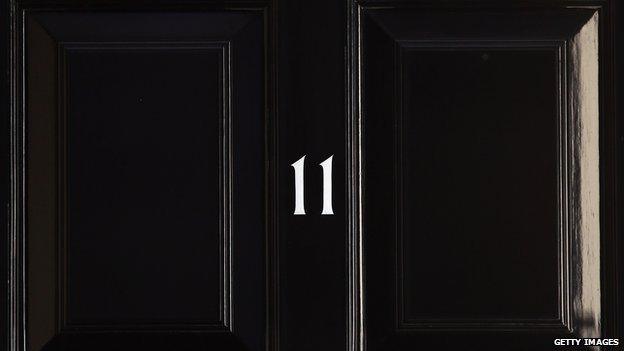George Osborne's 'big' Budget
- Published

"Big. Very Big". That's how one well-placed insider responded when asked to describe the Budget.
It ought to be. After all, this is the first Conservative budget in almost 20 years. The last was delivered by Ken Clarke in 1996. It has to deliver promises repeated for so long but yet to be delivered, like the cut to inheritance tax.
It has to fulfil the Tories' stated goals of cutting spending, cutting welfare and cutting tax whilst still claiming to be the "workers' party" pursuing a One Nation "we're all in it together" philosophy.
Pace slowed
And it comes at a time when what politicians love to call "difficult decisions" will never be easier to take.
After all, George Osborne no longer has to haggle with coalition partners, he faces a Labour Party which is still struggling to absorb its defeat and he is once again able to raise the spectre of Greece - "if a country's not in control of its borrowing the borrowing takes control of the country".
Nevertheless, the chancellor is expected to slow the pace of planned welfare cuts so that he will take three years instead of two to reach his promised target of £12bn.
I understand he will unveil proposals for £8bn of cuts by 2017/8 and a further £4bn by 2018/9.
Sources are stressing that this is very unlikely to make the cuts less controversial or to stop what Mr Osborne has called the "depressingly predictable howls of protest" which he expects to greet his Budget.
OBR criticism
In the last Parliament the deepest welfare cuts the government achieved amounted to £8bn over two years and experts have pointed out that the easy routes to saving money have already been taken - for example, ending the link between benefit rises and the higher RPI rate of inflation.
The main targets for welfare cuts are expected to be tax credits - in particular child tax credit - housing benefit and the elements of Employment Support Allowance which are paid to those deemed capable of work related activity (my colleagues Allegra Stratton and Michael Buchanan have examined these in depth).
The chancellor may also choose to slow the pace of overall spending cuts, although the Treasury is refusing to confirm this.
This would be seen as a response to criticism from the Office for Budget Responsibility after the last Budget of what they described as a "roller coaster" ride in public spending - sharp cuts for two years followed by steep rises.
The OECD has also called on the government to reconsider plans to front-load spending cuts at the beginning of this Parliament.
Wriggle room
Some forecasters have suggested that the deficit could be as much as £15bn lower than it was forecast to be just three months ago when George Osborne last delivered a Budget.
This would allow him a little bit of wriggle room to slow his spending cuts at the same time as pursuing tax cuts, particularly if he can also raise significant sums by increasing the tax paid by non-doms and by top-rate taxpayers on their pension contributions.
Mr Osborne will, as expected, reject calls for him to cut the top rate of income tax from 45p to 40p and will instead make further progress towards the Tories' target of increasing the personal income tax allowance to £12,500 and the threshold for higher rate tax to £50,000.
If he does all this and more the Budget will certainly live up to the pre-billing. Which word you add after "big" will, of course, depend on your political persuasion.